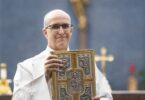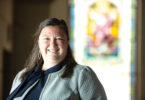
by Michael Podrebarac
During Lent, we are called to turn ourselves back toward God. We do so with renewed intention of purpose and confidence in his love and mercy. We do this both as individuals and as a church.
The liturgy provides us a particularly opportune means of doing this, especially in light of our renewed focus on what the church in the United States is referring to as eucharistic amazement.
To turn back to God, we discard our selfish aspirations, set aside parts of our desires and appetites, and focus more on God. We are also directed to spend some time focusing on our neighbor, especially the poor and those otherwise in need.
We are doing this in our daily lives —spending more time in prayer and abstaining from some pleasure — so that we can see God more clearly. Through both the savings we achieve by not spending so much on ourselves, as well as through sacrificial giving, we are able to provide greater resources to our neighbors who could use them.
We can also do this in the liturgy, particularly in the celebration of Mass. And just as the fruits of our Lenten disciplines afford us greater clarity and focus, so will the fruits of a renewed liturgical discipline afford us greater clarity and focus, and on what the Eucharist really offers us, if we’re really willing to receive.
The key term is “orientation.” What is our liturgical orientation, and how can we improve its clarity and focus?
We can start by reminding ourselves why we go to Mass in the first place. And I don’t mean because of our obligation — that’s simply a gratuitous yet important reminder that, as baptized Catholics, we are obliged to worship the God who has saved us.
No, I’m talking more about the why we go to Mass — as in, why did Christ leave us the great gift of the Eucharist?
We looked at this previously. The four “ends” of the Mass are, quite simply: our adoration of the living God; our thanksgiving to him for his incessant blessings and benefits; the atonement of our sins and willful failings; and our supplication to God for the needs of our neighbor and ourselves.
And the key to making the most of these ends?
“Ad Deum” — “toward God” — this is how we ought to orient ourselves when we come to Mass. God is the one we adore. It is to God we give our thanks. God himself has rescued us from the darkness of sin and death. It is to God we raise our voices of supplication.
At Mass, our orientation — to whom we are turned — makes all the difference in our experience of and relationship with God.






